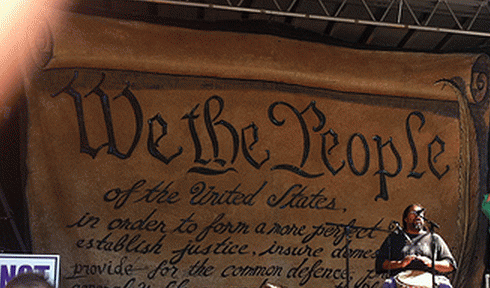Despite
the republic's maturity, chasms divide how differing ideological viewpoints in
the United States understand our constitution's fundamentals:
Liberal Stereotype: The federal government must supervise
healthcare to protect women from state legislatures that denigrate abortion rights.
"Constitutional Conservative": As the Constitution says nothing of abortion, states should reject Roe v. Wade . And the Constitution precludes federal healthcare mandates, despite Justice Roberts's error on Obamacare.
Liberal Stereotype: Our constitution today is more than just
the document drafted in Philadelphia deemed adopted in 1788, with its
amendments.
"Constitutional Conservative": That would violate the rule of law,
which requires legal certainty.
Liberal Stereotype: No, the rule of law demands democracy
and individual rights, including the rights of gay Americans.
A little reflection
and historical perspective resolves a lot of that gap. My "liberal" oversimplifies,
but the misconceptions voiced by the "constitutional conservative" tend more to
derail productive debate. Not presuming all constitutional conservatives think alike,
I focus on monotextualists--those who claim a single document, alone, constitutes
us. The times urge them to reconsider. The gun rights and other liberties monotextualists
believe to be free, from not just federal but also state infringement, do not
find protection from states' abuses in constitutional text alone.
In short, America
is not constituted only by words of a 225-year-old document even the founders
did not treat as exclusive.
True, we all somehow
embrace it for constitutional meaning. But reflecting on how we know what
constitutes our nation, the reasons for still looking to that text also direct
our gaze beyond it. That is, the "1788 Constitution," as amended, has never
been our full constitution--our threshold for government's legitimacy has always
required more. Since independence, we have remained devoted both to the
people's sovereignty and to inalienable rights. Through two centuries, the people
sovereignly have endorsed a historically-developed understanding of the constitutional
framework reflected in the 1788 text, an understanding abiding in precedent. What's
more, as no inalienable rights--say, of privacy in spousal relations or of defending
one's home--can have been alienated by failure to write them down, our constitution
protects some rights beyond the amended 1788 text.
Neither legally nor
politically legitimate, the persisting fiction of a single-text constitution obstructs
genuine discussion, weakening the rule of law. True, we need legal clarity and
predictability. But monotextualists evangelize an unattainable constitutional certitude--a
mythologized fantasy that demeans the very democracy and individual rights the
rule of law requires, that would violate our present constitution. Meanwhile, real
contested issues languish for want of greater public notice and debate. By thus
sidetracking our national discourse, strict-text zealotry undermines another rule
of law value--public understanding. And misunderstanding proliferates when knowledgeable
participants in public debate fail to contest such factually-bankrupt descriptions
of our constitution.
Progress awaits a
wider public respect for our whole constitution, blocked by two myths. The myth
of law in general, "textual infallibility," mistakes that societies can draft
perfect legal codes--schemes that handle all disputes with no clarifying,
conflict-resolving, or gap-filling interpretation by judges. And from that
fallacy monotextualists spin a second myth, "strict construction," which assumes
it possible and legitimate to rely exclusively on words of constitutional texts.
Overcoming those myths--admitting judges must elaborate our constitution--promises
more-productive debate, focused on how best to constrain that judicial role.
For the pundits who
appreciate that our full constitution is more than a narrow reading of text, yet
still struggle with monotextualist claims, I offer rational and pragmatic responses:
First, reason precludes a strict-text-only approach, since (I) a constitution
is not just a document but a broader concept, ours including inalienable rights
impervious to textual limits; (II) history shows pre-planned systems do not anticipate
all legal issues, so judges must fill gaps; and (III) legal texts' inherent
fallibility and original meaning's uncertainty prevent strict construction, which,
even if possible, would violate inalienable rights and popular sovereignty. Moreover,
a whole-constitution approach makes more practical sense, as (IV) amendment cannot
eliminate need for interpretation and can undermine conservative values, while well-selected
judges follow principles that limit their discretion when they provide needed
interpretation; and (V) owning up to those realities still leaves much for
debate, including abortion, gay rights, and federal power, but narrows the issues.
These five points
also speak to conservatives recently inclined to constitutional reflection. The
2010 gun rights decision, McDonald v.
Chicago, challenges monotextualist dogma about constitutional fundamentals.
As the Second Amendment restricts the federal government, not the states, it did
not apply to Chicago's challenged gun-control regulation. As detailed below, the
Court thus exceeded limits of strict construction to find a federal right outside
constitutional text alone, a right protecting gun owners from excessive state
regulation. For those who hold such rights dear, realizing they depend on
constitutional sources beyond text should provoke them to rethink
monotextualism.
Next Page 1 | 2 | 3 | 4 | 5 | 6 | 7 | 8 | 9 | 10 | 11 | 12
(Note: You can view every article as one long page if you sign up as an Advocate Member, or higher).






